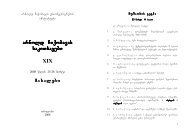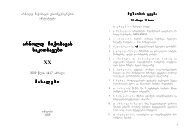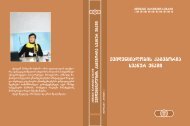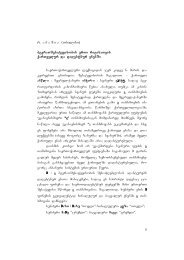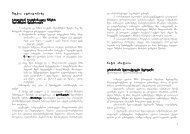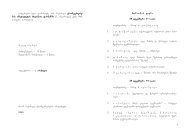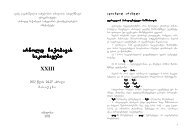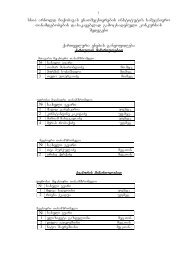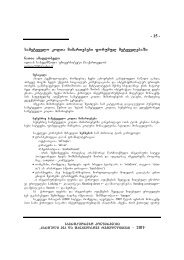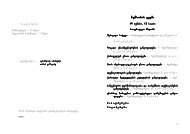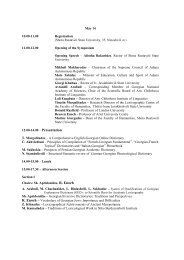iberiul-kavkasiuri enaTmecniereba XXXIX
iberiul-kavkasiuri enaTmecniereba XXXIX
iberiul-kavkasiuri enaTmecniereba XXXIX
You also want an ePaper? Increase the reach of your titles
YUMPU automatically turns print PDFs into web optimized ePapers that Google loves.
176<br />
m. suxiSvili<br />
jorbenaZe 1975 _ b. jorbenaZe, zmnis gvaris formaTa warmoebisa<br />
da funqciis sakiTxebi qarTulSi, Tsu gamomcemloba, Tbilisi.<br />
jorbenaZe 1983 _ b. jorbenaZe, zmnis xmovanprefiqsuli warmoeba<br />
qarTulSi, Tbilisi.<br />
MURMAN SUKHISHVILI<br />
Passive and Reciprocal Semantic of Intransitive Verbs<br />
with the e- Prefix<br />
S u m m a r y<br />
Bipersonal intransitive verbs with the e- prefix are polysemantic in Georgian.<br />
According to meaning they are divided in two basic groups:<br />
1. Verbs containing passive meaning:<br />
e.g. e-c'ereba is mas (He/she/it is being written for him/her/it)<br />
e-zrdeba is mas (He/she/it is growing for him/her/it)<br />
2. Active verbs containing reciprocal contents. Plural form is an indicator of the<br />
reciprocal contents:<br />
e.g. e-lap'arak'eba is mas (He/she is talking with him/her)<br />
Plur. e-lap'arak'ebian isini ertmanets (They are talking with each other)<br />
e-čxubeba is mas (He/she is quarreling with him/her)<br />
Plur. e-čxubebian isini ertmanets (They are quarrelling with each other)<br />
For displaying the passive meaning of a verb, dictionaries provide an explanation<br />
of the bipersonal forms with the e- prefix as follows:<br />
a) monopersonal passive verb with the i- prefix of the same stem + possessive<br />
pronoun in the third person, misi (his/her/its);<br />
b) active verb with an indefinite subject in the plural:<br />
e-zrdeba is mas (He/she/it is growing for him/her/it) – i-zrdeba misi (His/her/its<br />
(hair) is growing); uzrdian (He/she/it is growing for them in general).<br />
Semantic differences occurring in these two basic groups of the identical model<br />
derive from different grammatical relations:<br />
Bipersonal passive verbs with the e- prefix have their opposition forms, i.e.<br />
monopersonal passive verbs with the i- prefix. But opposition forms of reciprocal active<br />
verbs with the e- prefix are monopersonal medial verbs with the same reciprocal<br />
meaning:<br />
e-lap'arak'eba is mas (He is talking with him)<br />
Plur. e-lap'arak'ebian isini ertmanets (They are talking with each other)<br />
lap'arak'obs is mastan (He talks with him)<br />
Plur. lap'arak'oben ertmanettan (They talk with each other)<br />
Reciprocal meaning is expressed by attaching reciprocal pronoun ertmaneti (each<br />
other) in the dative case to the opposition forms in the plural. The reciprocal pronoun<br />
ertmaneti is used both with and without postpositions: with -tan (with) or -ši (in)<br />
postpositions it is added to medial monopersonal verbs, but bipersonal verbs attach it<br />
without postposition.



